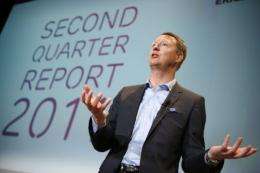The chief executive of Swedish telecom equipment maker Ericsson, Hans Vestberg, announced a 65 percent jump in second quarter net profit
Swedish telecom equipment maker Ericsson reported Thursday a 65 percent jump in second quarter net profit on strong sales but this still fell short of expectations and its shares slumped.
The group said that the strength of the krona and restructuring costs had held profits back to 3.12 billion kronor (342 million euros, $488 million). Analysts polled by Dow Jones Newswires had expected 3.92 billion kronor.
The cost of job cuts in Sweden, affecting 500 sales and administrative positions, had reduced the net figure by 1.3 billion kronor. The group revised upwards by half the cost of restructuring for the year from 2.0 billion kronor to 3.0 billion kronor.
The group employs 98,000 people, 10,500 more than 12 months ago, and leads its market, ahead of German-Finnish group Nokia Siemens, the French-US firm Alcatel-Lucent and the rising Chinese manufacturers Huawei and ZTE.
Ericsson said that its sales in the second quarter rose 14 percent from a year earlier to 54.77 billion kronor, in line with expectations.
Operating profit rose 41 percent.
Ericsson shares fell sharply in response, closing Thursday down nearly nine percent in an overall market down 0.50 percent.
Ericsson previously announced a strong improvement in the the first quarter of this year.
Existing mobile phone networks are becoming saturated with traffic for mobile internet devices and smartphones which use 10 times more capacity than conventional mobile telephones.
Telecom operators are turning to equipment providers to increase capacity.
Chief executive Hans Vestberg said that strong growth in recent quarters was continuing, notably in Brazil, China, Germany, South Korea, India and Russia.
But sales in North America, the company's biggest market with 22 percent of the total, fell by 6.0 percent, while western Europe and the Mediterranean region each dropped 2.0 percent.
Vestberg acknowledged that the overall outcome was mixed.
Excluding the effect of currency factors, sales rose 270 percent on a 12-month comparison but the rise of the krona reduced this to 14 percent.
(c) 2011 AFP




















